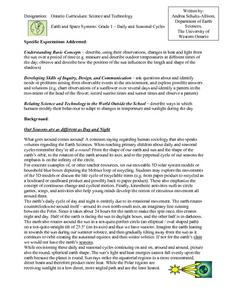Curated OER
Reasons for the Seasons
Middle schoolers discover how the Earth's axis of rotation affects the angle of sunlight and the length of day. They take a survey and give the survey out to family members and friends. They tally their findings and then determine the...
Curated OER
Seasonal Cycles And Changes
Second graders recall the affect of direct and angled sunlight on the seasons, describe some results of warming soil and air in spring, predict the changes in buds when twigs are placed in water, and taste a product of tree sap and...
Curated OER
The Reason for the Seasons; Science, Geography
Students think about what causes the seasons to change, reflect on what they know about seasons and how their lives affected by seasonal changes.
Curated OER
Catching Some Rays
Sixth graders explore the tilt of Earth's axis. In this Earth instructional activity, 6th graders read a Greek mythology story explaining why there are seasons. Students build a sun-ray gathering tool from styrofoam, glue,...
University of Arizona
The Exotic Vacation
Students explain the concepts and vocabulary of Earth's rotation. They plan imaginary vacations based on the seasons in different locations. This is a very creative lesson plan, which students enjoy.
Curated OER
Seasons
Students identify and define the vocabulary words: summer, spring, fall, and rotation. They describe how the earth's rotation affects the seasons. Students match appropriate clothing with each season. They discuss why a particular...
Curated OER
Science: Daily and Seasonal Cycles
First graders use their observations to describe daily and seasonal cycles. through a demonstration using a suspended ball and flashlight, they determine the time of day in various locations. Next, 1st graders participate in a...
Curated OER
Celebrating the Solstice and Equinox
Fourth graders graph the number of daylight hors throughout the year and examine why day length varies. They discover that seasonal changes and latitude on Earth affect the number of hours of daylight in each day. Students listen to...
Curated OER
Heating Up: Direct and Indirect Sunlight
Students, by conducting simulations, explore the effects of direct and indirect sunlight on heating of the Earth.
Curated OER
Weather "Why"
Students research weather and explore how to use their research information. In this weather information lesson plan, students visit a given website for weather forecasts. Students graph the weather, sing weather songs and select a class...
Curated OER
Astrology: Fact or Fiction?
Students explore the topic of astrology and review the beliefs behind it. They read sample horoscopes. Using a portable digital planetarium, they view the night sky and the zodiac constellations. They examine and discuss the science...
Curated OER
Is it Really Winter in Australia? It is June!
The purpose of this activity is to determine how the location of a place on the Earth (hemisphere) determines what season that place is experiencing relative to the Sun's rays. Day one the young scholars will be introduced to the terms...
Curated OER
Water and Ice: Part 1
Students observe the state changes in water. In this matter lesson, students observe, measure, and describe water as it changes state. Students explore how water can change from a solid to a liquid then back again. They journal their...
Curated OER
Exploring the Night Sky: Fall/Winter
Pupils explain how moon phases occur. They explain three ways that the night sky has been used through history. Students locate some of the constellations in the night sky. They discuss stories and myths surrounding stars.
Curated OER
Constructing a Planetarium
Students work together to create their own planetarium. They observe the night sky and make a design. They also examine constellations and paint them onto the model of the planetarium.
Science Education Resource Center at Carleton College
Serc: Seasons
For this activity, students create a small model of the Earth using a styrofoam ball and a skewer. They then explore the relationship between the Earth and the Sun (a flashlight) to understand why it is hottest at the Equator, and why we...

















